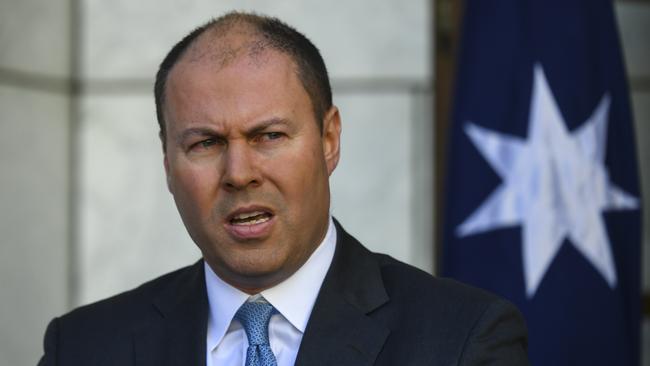Our superannuation nest egg has turned rotten
The vast, artificial, highly complex edifice of compulsory superannuation costs taxpayers a fortune.

Excuse me? I reread it. It’s true. Increasing the compulsory rate of superannuation from 9 per cent to 12 per cent doesn’t save taxpayers money.
Indeed, it’s worse than that. The vast, artificial, highly complex edifice of compulsory super costs taxpayers a fortune. That, in turn, requires other taxes to be higher than necessary, with all the associated damage caused. Why intervene in such a massive way — siphoning off 9.5 per cent of wages and salaries into untouchable accounts — if it doesn’t save money, even in the long run? It’s a question too few pose, and even fewer answer.
The government’s retirement income review, due this month, is likely to reach the same conclusion. Unlike the Rudd government, which ignored Ken Henry’s advice in 2010, legislating to lift the compulsory saving rate to 12 per cent to reward its union supporters, the Morrison government should move to make the system pay for itself.

Liberal senator Andrew Bragg has a short book on super, Bad Egg: How to Fix Super, drawing attention to super’s shortcomings. It should be compulsory reading for all MPs — many are easily seduced by propaganda directly or indirectly funded by the sector. “The $32bn a year in fees and the $36bn fiscal cost of superannuation should be taken into account when calculating the overall success of the system,” Bragg notes.
Together, that’s more than the cost of the Age Pension, the federal government’s biggest single expense — about $50bn this financial year. Those fees are money that could be spent by workers on goods and services. And the forgone tax revenue from taxing super contributions and earnings at concessional rates is money that could slash income tax, boosting incentives to work and save. The entire revenue “cost” of the government’s legislated tax cuts over the four years from last July is $5.7bn. Imagine what you could do with $36bn every year.
“The super industry asserts the system is saving $9bn per annum in reduced pension outlays, which is a pittance,” Bragg notes, arguing “a clear fiscal saving from super has not yet emerged”. That’s an understatement.
So what then is the rationale for compulsory superannuation?
Whatever the public and private costs of maintaining super, it’s all worth it to ensure people save “enough” for retirement, is the argument of last resort. In fact there has never been solid evidence individuals weren’t saving enough for retirement. Their home, some voluntary savings and the Age Pension were ample.
After the biggest house price boom in history — which has left retirees with huge equity to draw on and younger generations with much bigger deposits to save for — the argument is weaker still. Forced saving in super has encouraged taking on more debt, unnecessarily exposing us all to interest rate shocks.
As Bragg points out, super has been a boon for the industry, which includes the financial services sector, regulators, employer groups and unions. In the 2019 financial year industry funds paid unions more than $11m, a sum Bragg estimates will grow to $31.5m by 2030.
As Upton Sinclair once said, a man won’t understand something if his salary depends on not understanding it.

The forthcoming review will make it difficult for an intelligent, fair-minded person to conclude lifting the super guarantee to 12 per cent is good policy. Josh Frydenberg should use the review, and sense of crisis created by the recession, to launch changes to super. At least two are required.
First, it must become voluntary, giving workers the option of a significant pay rise in difficult times. Employers don’t care if it is paid as wages or super. Such a policy might be well received by more than two million voters who have accessed up to $20,000 of their super in recent months.
Second, for those who don’t choose a fund, there should be a no-frills default option. That’s what most countries do.
For all the talk of engagement, there’ll never be genuine competition in a compulsory system. Indeed, a quarter of us don’t even check our balance; another 19 per cent check it once a year or less.
Whether it’s the Future Fund, the Australian Prudential Regulation Authority or the Commonwealth Superannuation Corporation (which oversees the various public sector schemes), a public trustee charged with keeping fees low would ensure fees collapsed across the $3 trillion system.
Of course, for the Coalition, reform is more than a question of economics. Leaving super to grow unchecked creates a powerful unelected political opponent. Super funds will own 20 per cent of all listed Australian companies by 2034, according to Rice Warner, which will concentrate shareholder voting power in the hands of a massive funds. It’s naive to think trustees won’t use their power to reflect political priorities.








I remember where I was a decade ago when I read the section of the Henry tax review that dealt with retirement income policy. It was a shock. “An increase in the superannuation guarantee would also have a net cost to government revenue even over the long term (that is, the loss of income tax revenue would not be replaced fully by an increase in superannuation tax collections or a reduction in age pension costs),” it said on page 11 of the report on strategic issues related to the retirement income system.